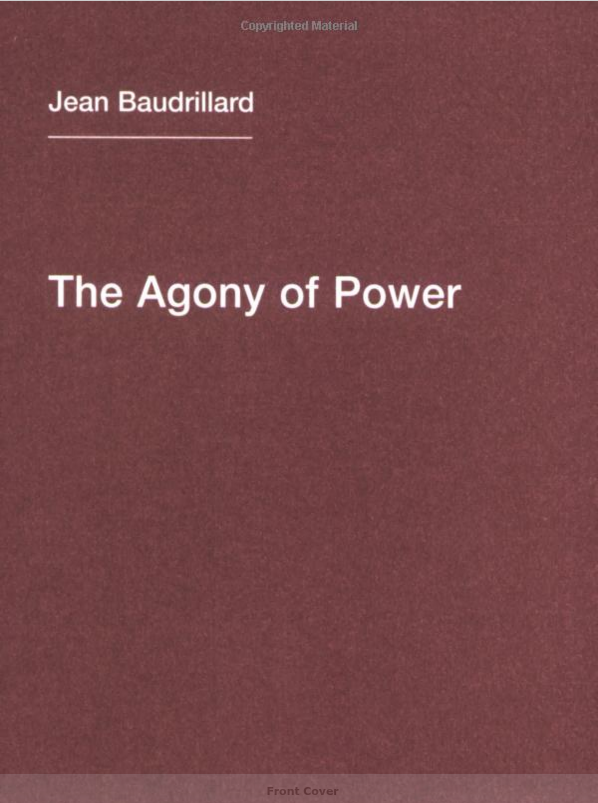
In these previously unpublished manuscripts written just before his death in 2007, Jean Baudrillard takes a last crack at the bewildering situation currently facing us as we exit the system of “domination” (based on alienation, revolt, revolution) and enter a world of generalized “hegemony” in which everyone becomes both hostage and accomplice of the global market. But in the free-form market of political and sexual liberation, as the possibility of revolution (and our understanding of it) dissipates, Baudrillard sees the hegemonic process as only beginning. Once expelled, negativity returns from within ourselves as an antagonistic force—most vividly in the phenomenon of terrorism, but also as irony, mockery, and the symbolic liquidation of all human values. This is the dimension of hegemony marked by an unbridled circulation—of capital, goods, information, or manufactured history—that is bringing the very concept of exchange to an end and pushing capital beyond its limits: to the point at which it destroys the conditions of its own existence. In the system of hegemony, the alienated, the oppressed, and the colonized find themselves on the side of the system that holds them hostage. In this paradoxical moment in which history has turned to farce, domination itself may appear to have been a lesser evil. This book gathers together three essays—“From Domination to Hegemony,” «The White Terror of World Order,» and «Where Good Grows»—and a 2005 interview with Baudrillard by Sylvère Lotringer. Semiotext(e) launched Baudrillard into English back in the early 1980s; now, as our media and information infested “ultra-reality” finally catches up with his theory, Semiotext(e) offers The Agony of Power, Baudrillard’s unsettling coda.
The most influential book of the past seventy-five years: a groundbreaking exploration of everything we know about what we don’t know, now with a new . . .
«Kanskje finnes det for latteren ennå en fremtid!», skriver Nietzsche i åpningen av Den muntre vitenskapen. Med satire og skarpe iakttakelser legger han blant annet . . .
Hvorfor gjør vi feil? Og hvorfor i all verden fortsetter vi å gjøre de samme feilene gang på gang? Vi tenker i ett av to . . .
«The planet is sick. Human beings are guilty of damaging it. We have to pay. Today, that is the orthodoxy throughout the Western world. Distrust . . .
Virilio’s exploration of the relationship between technology, war and information technology. “Civilization or the militarization of science?” With this typically hyperbolic and provocative question as . . .
With this book Paul Virilio inaugurated the new science whose object of study is the «dromocratic» revolution. Speed and Politics (first published in France in . . .
The Believing Brain is bestselling author Michael Shermer’s comprehensive and provocative theory on how beliefs are born, formed, reinforced, challenged, changed, and extinguishedSynthesizing thirty years . . .
«Verden er min forestilling.» Med denne påstanden innleder Schopenhauer sitt hovedverk fra 1818. Alt som kan erkjennes, er objekt for et subjekt. Omvendt gjelder det . . .
Michel Foucault takes us into the first two centuries of our own era, into the Golden Age of Rome, to reveal a subtle but decisive . . .
In this sequel to The History of Sexuality, Volume I: An Introduction, the brilliantly original French thinker who died in 1984 gives an analysis of . . .
Michel Foucault offers an iconoclastic exploration of why we feel compelled to continually analyze and discuss sex, and of the social and mental mechanisms of . . .
There is a catastrophe within contemporary art. What I call the «optically correct» is at stake. The vision machine and the motor have triggered it, . . .
“One day the day will come when the day will not come.” Bleak in its analysis of the social destruction wrought by modern technologies of . . .
Massive technological innovations now allow scientists to extract and analyze ancient DNA as never before, and it has become clear–in part from David Reich’s own . . .
‘Hinsides godt og ondt’ er en hyllest til livet og kreativiteten og på mange måter et endelig farvel med metafysikken. I åpningen sier Nietzsche at . . .
Taboo and sacrifice, transgression and language, death and sensuality—Georges Bataille pursues these themes with an original, often startling perspective. He challenges any single discourse on . . .
How would it be if what we take for human advance were simply a technological progress that literally leaves us out of its equations? What . . .
A trenchant critique of new techniques of waging war, and its reduction to images on a screen Written with his characteristic flair, Virilio’s latest book . . .
With around 645 million people expected to be displaced Ð by wars and other catastrophes Ð by 2050, Virilio begins The Futurism of the Instant . . .
The underlying premise of all of Virilio’s work is that we must analyzespeed and acceleration throughout history and see it as constitutive of historicalepochs. Continual . . .